Welcome to a refined take on one of the Philippines' most cherished dishes - Camto Soup. This exceptional beef soup represents the perfect marriage of traditional Filipino cooking techniques and bold flavors, combining the depth of slow-simmered bone broth with the complex sweetness of pares sauce.
At its heart is high-quality flank steak, known locally as camto, carefully braised until tender and enriched with aromatics like star anise and garlic. While this dish has humble origins in Manila's beloved pares establishments, it has earned its reputation as a masterpiece of Filipino cuisine, offering both the comfort of a traditional soup and the sophistication of a well-crafted main course.
Jump to:
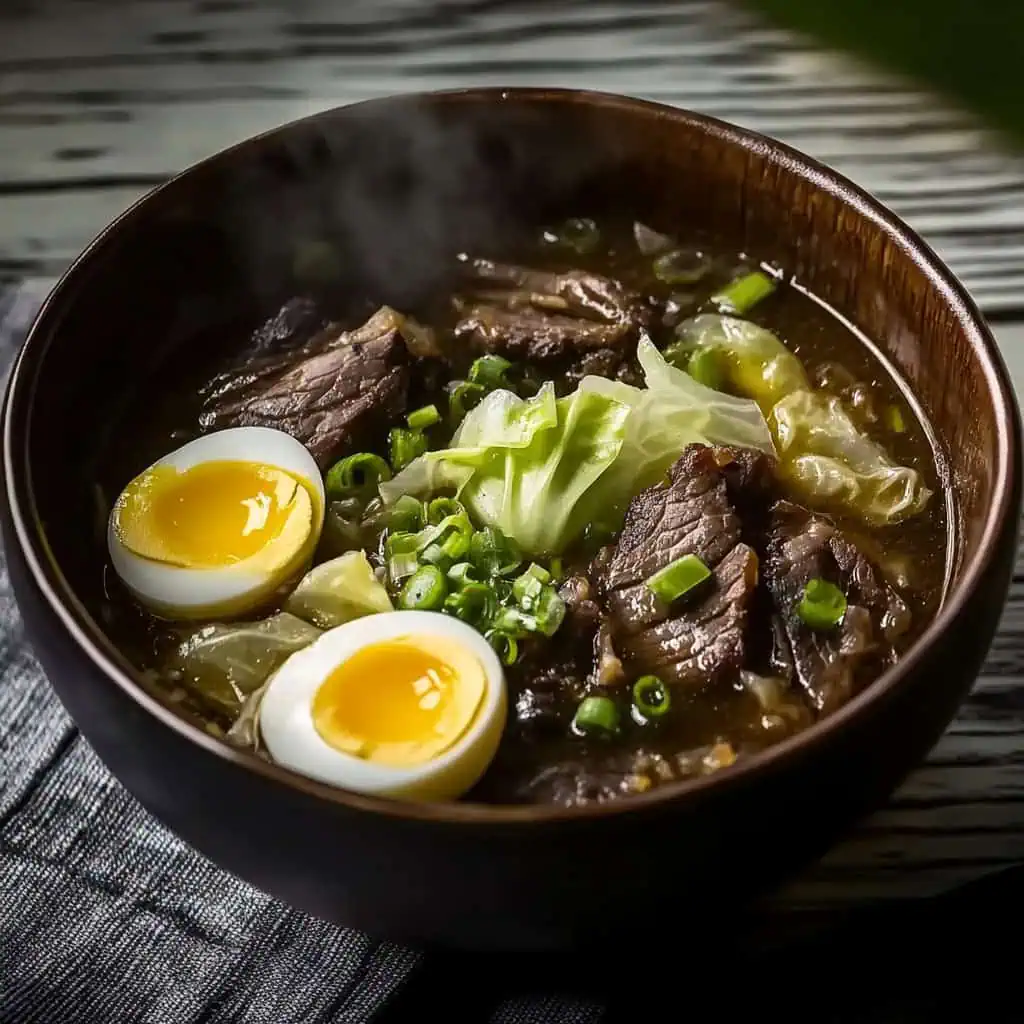
Why You'll Love This Recipe
- Rich, Complex Flavors: Combines the hearty essence of beef bone broth with the sweet-savory notes of pares sauce
- Two-in-One Dish: Enjoy it as a soup or as a complete meal with rice or noodles
- Perfect for Batch Cooking: Makes excellent leftovers and freezes well
- Restaurant-Quality: Recreate the famous taste of Philippine pares eateries at home
- Customizable: Can be adjusted to your preferred level of sweetness and saltiness
Ingredients
Each component in this recipe serves a specific purpose: the beef bones and flank steak provide rich, meaty flavor, while aromatics like garlic, onions, and star anise add depth.
The soy sauce and fish sauce bring umami, while brown sugar balances with sweetness. Chinese cabbage adds freshness, cornstarch thickens the sauce, and garnishes like eggs and spring onions provide textural contrast and visual appeal.
Together, they create the perfect balance of savory, sweet, and aromatic flavors that defines authentic Camto Soup.
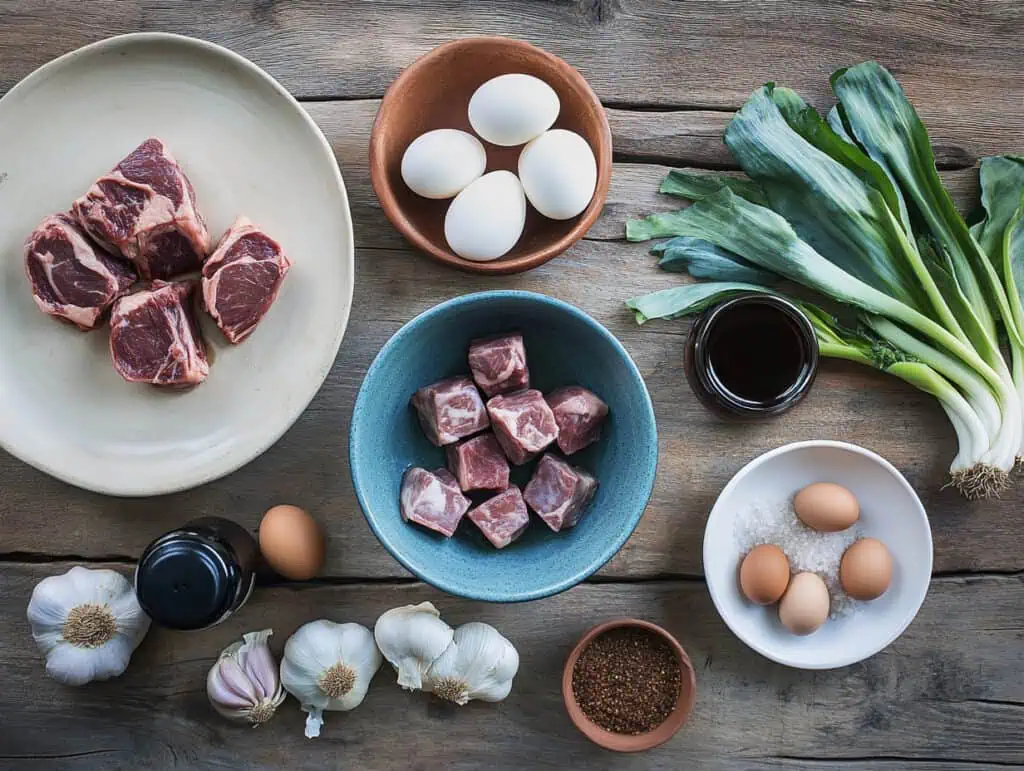
- 1½ kg beef leg bones - These provide the deep, rich flavor base for your broth
- 700 g beef flank steak or brisket (camto) - Cut into small strips or cubes
- 8 cups water
- 2 white onions - Quartered
- 2 whole heads garlic - Minced
- Salt - To taste
- Oil for sautéing
- ½ cup soy sauce
- 6 tablespoons brown sugar
- 3 pieces star anise
- 2 pieces dried bay leaves
- 2 tablespoons cornstarch - Mixed in 4 tablespoons water
- 1 teaspoon ground black pepper
- Fish sauce - To taste
- ½ head Chinese cabbage - Chopped
- 6 hard-boiled eggs - Peeled and sliced
- Spring onions - Chopped
- Fried garlic
Equipment
- Large stock pot (at least 8-quart capacity) - For simmering the bone broth; provides enough space for bones and water while allowing room for the liquid to simmer without boiling over
- Medium pot (3-4 quart) - For preparing the pares sauce; allows proper reduction and flavor concentration
- Sharp chef's knife - For cutting meat and vegetables precisely; dull knives can tear meat fibers
- Fine-mesh strainer - For removing impurities from the broth; ensures a clear, clean-tasting soup
- Measuring cups and spoons - For accurate ingredient portions; crucial for balanced flavor
- Wooden spoon - For stirring without scratching the pot; metal utensils can damage cookware
- Cutting board (preferably wood) - For ingredients preparation; wood is gentler on knife blades
- Small bowl - For preparing the cornstarch slurry; mixing in a separate container prevents lumps
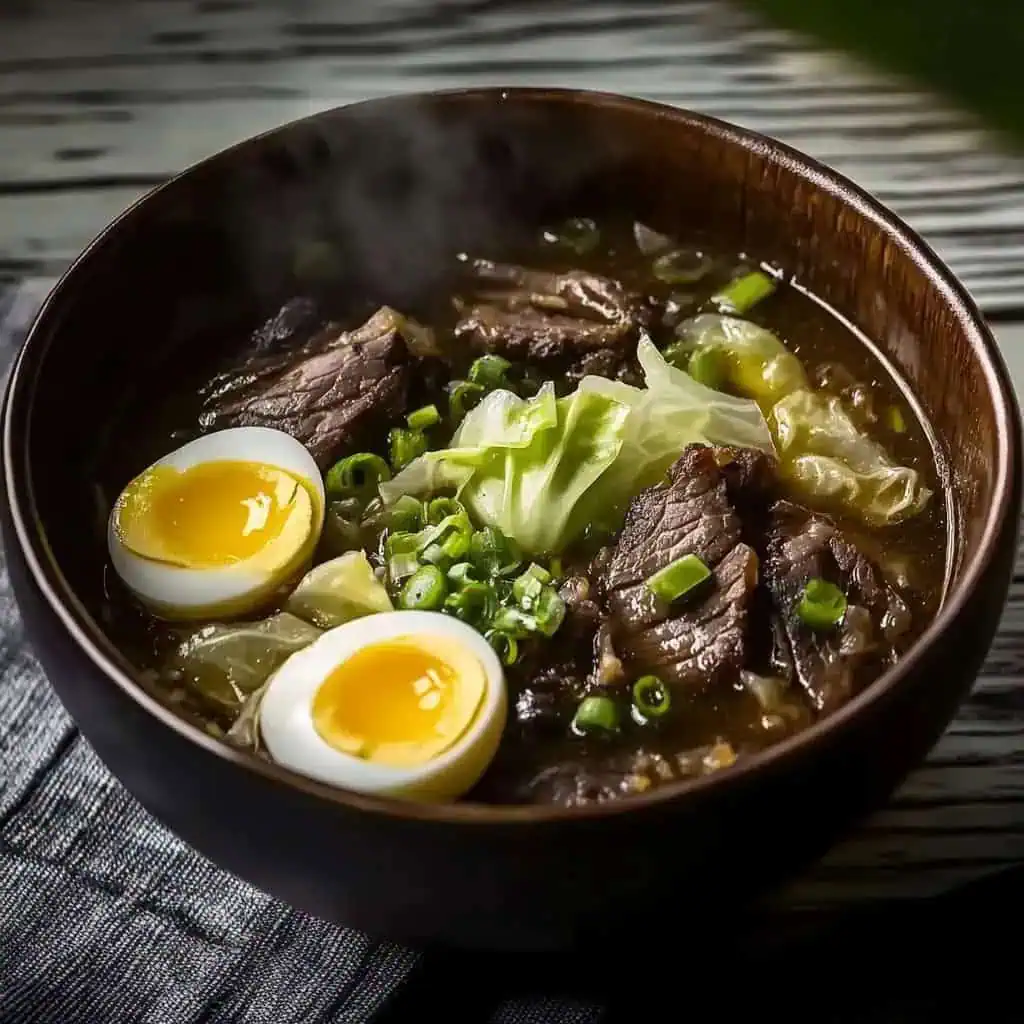
How To Make
- Begin by cleaning the beef bones under running water and patting them dry. Cut the flank steak into 1-inch cubes. Quarter the onions and mince the garlic. Mix cornstarch with 4 tablespoons of water in a small bowl until smooth.
- Heat oil in a large pot over medium heat. Add half of the minced garlic and quartered onions. Cook until fragrant and the onions turn translucent, about 2 minutes. Add the beef pieces and bones, then cook until all sides are nicely browned, around 5-7 minutes.
- Pour in 8 cups of water and add a small pinch of salt. Bring everything to a boil, then lower the heat. Let it simmer gently for 1½ hours. Keep an eye on the water level - add more hot water if needed to maintain the same amount of liquid.
- After this time, carefully remove just the flank steak pieces from the pot, leaving the bones behind. Keep the bones simmering on very low heat for another hour - this makes the broth even richer.
- Now make the pares sauce in a separate pot. Heat some oil and cook the remaining garlic until golden brown. Take out the garlic and save it for later. In the same pot, add 1 cup of the beef broth from your simmering bones, the cooked flank steak, soy sauce, brown sugar, star anise, bay leaves, black pepper, and your cornstarch mixture. Let this simmer for 30 minutes until the meat is very tender. Add fish sauce to taste.
- Go back to your bone broth and add the chopped cabbage. Cook for just 5 minutes until the cabbage is tender but still has some crunch.
- To serve, fill each bowl with the hot bone broth and cabbage. Add a generous portion of the flank steak with its pares sauce. Top with sliced hard-boiled eggs, spring onions, and the crispy garlic you set aside earlier.
- Serve while hot with your choice of steamed rice or noodles. For the best experience, let everyone add extra fish sauce or soy sauce to their own taste.

Tips from Lola's Kitchen
- Low and slow is key - Simmer on the lowest possible heat for the clearest broth. Rapid boiling makes the broth cloudy and prevents maximum flavor extraction.
- Brown before boiling - Don't skip browning the meat and bones - it adds significant depth to the flavor through the Maillard reaction.
- Garlic timing matters - Add the fried garlic garnish just before serving to maintain crispiness. Premature addition will make it soggy.
- Overnight magic - For best results, prepare a day ahead and reheat - the flavors develop overnight and deepen significantly.
- Skimming is essential - Remove any scum that rises to the surface during the first 30 minutes of simmering for a cleaner-tasting broth.
- Taste as you go - The balance of sweet and savory is personal preference, so adjust gradually until perfect.
Substitutions
- Flank Steak: If unavailable, use beef brisket, chuck, or shank meat. Each will provide a slightly different texture but similar flavor.
- Star Anise: Chinese five-spice powder (½ tsp) can work in a pinch, though the flavor won't be identical.
- Brown Sugar: Muscovado sugar adds more depth, or use regular sugar with a touch of molasses.
- Chinese Cabbage: Regular green cabbage or pechay (bok choy) work well as alternatives.
- Cornstarch: All-purpose flour can be used as a thickener (double the amount), but mix thoroughly to avoid lumps.
- Beef Bones: Oxtail or beef shank with bones can substitute if leg bones aren't available.
Troubleshooting
- Cloudy Broth: Strain through cheesecloth or reduce heat while simmering. Never let the broth boil vigorously.
- Tough Meat: Extend cooking time by 15-30 minutes. The meat should easily pull apart with a fork when done.
- Too Sweet/Salty: Adjust by adding more plain broth to dilute, or balance with a splash of vinegar.
- Too Thin: Add more cornstarch slurry (1 teaspoon cornstarch mixed with 2 teaspoon cold water) and simmer for 5 minutes.
- Greasy Surface: Chill the broth and remove the solidified fat layer, then reheat.
Storage & Reheating
- Refrigeration: Store in airtight containers for up to 4 days. Keep the broth and meat portions separate if possible.
- Freezing: Freeze for up to 3 months (store soup and meat separately). Ice cube trays work well for portioning broth.
- Reheating: Heat gently on the stovetop to a simmer (around 85°C/185°F). Avoid microwaving, which can make the meat tough.
- Important: Do not repeatedly reheat the soup; only warm the portion you plan to consume.
- Revitalization: Add fresh garnishes (spring onions, fried garlic) after reheating to refresh the flavors.
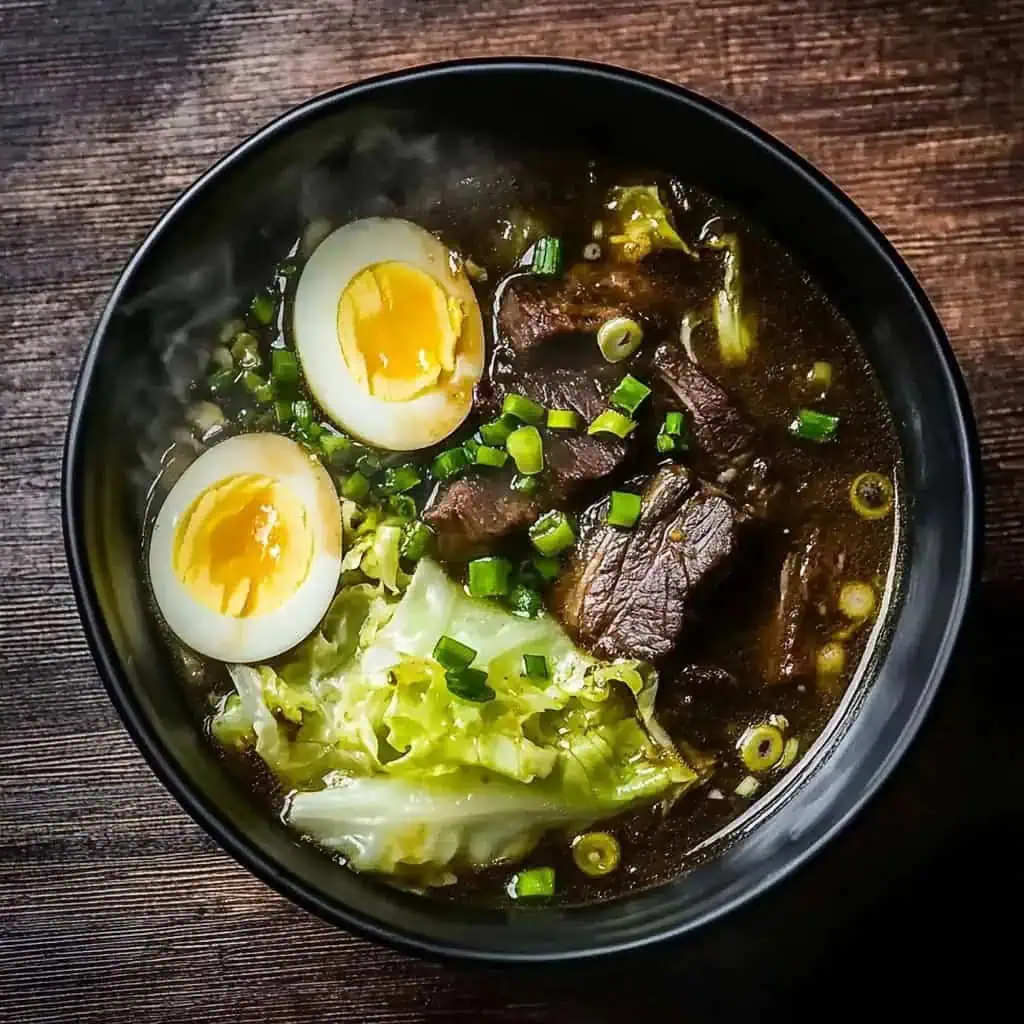
FAQ
What is "camto" exactly?
Camto is the Filipino term for flank steak, a lean cut of beef from the abdominal muscles. It's prized for its rich flavor and becomes tender when properly braised.
Can I make this in advance for a party?
Yes, in fact, the flavor actually improves overnight as the ingredients have time to meld. Prepare it a day ahead, refrigerate, and gently reheat before serving.
Why use two pots instead of cooking everything together?
This method allows for proper development of both the clear broth and rich pares sauce. Cooking separately ensures the broth stays clear while the sauce becomes concentrated.
How do I know when the meat is done?
It should be tender enough to easily pull apart with a fork. Undercooked meat will be chewy, while properly cooked camto will melt in your mouth.
Can I freeze the soup?
Yes, but store the broth and meat separately for best results. Freeze in airtight containers for up to 3 months and thaw in the refrigerator overnight before reheating.
What's the difference between Camto Soup and regular nilagang baka?
The key difference is the pares sauce. Nilagang baka is a simple clear broth with beef and vegetables, while Camto Soup incorporates the sweet-savory pares sauce for more complex flavors.
Can I use a pressure cooker or Instant Pot to speed up the process?
Yes, you can reduce cooking time significantly. Cook the bones for 25-30 minutes and the meat for 15 minutes under pressure, then proceed with the sauce preparation.
What can I serve with Camto Soup?
Traditional accompaniments include steamed white rice, egg noodles (mami), garlic fried rice, or crusty bread. A small dish of fish sauce with calamansi or lemon is often served on the side for additional seasoning.
Related
Looking for other recipes like this? Try these:
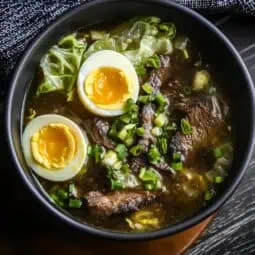
Camto Soup
Equipment
- Large stock pot (kaldero) For simmering the bone broth
- Medium Pot For preparing the pares sauce
- Sharp knife (kutsilyo) For cutting meat and vegetables
- Strainer [Salaan] For removing impurities from the broth
- Measuring cups and spoons (Panukat) For accurate ingredients portions
- Wooden spoon (sandok) For stirring without scratching the pot
- Chopping board (sangkalan) For ingredients preparation
- Small bowl For cornstarch slurry
Ingredients
For the Soup (Sabaw)
- 1½ kg beef leg bones buto-buto ng baka
- 700 g beef flank steak or brisket camto o brisket, cut into small strips or cubes
- 8 cups water tubig
- 2 white onions sibuyas, quartered
- 2 whole heads garlic bawang, minced
- Salt asin to taste
- Oil for sautéing
For the Pares Sauce (Sabaw ng Pares)
- ½ cup soy sauce toyo
- 6 tablespoon brown sugar asukal na pula
- 3 pieces star anise sangke
- 2 pieces dried bay leaves dahon ng laurel
- 2 tablespoon cornstarch gawgaw, mixed in 4 tablespoon water
- 1 teaspoon ground black pepper paminta
- Fish sauce patis to taste
Garnishes
- ½ head Chinese cabbage repolyo, chopped
- 6 hard-boiled eggs itlog na maalat, peeled and sliced
- Spring onions sibuyas dahon, chopped
- Fried garlic sinangag na bawang
Instructions
- Begin by cleaning the beef bones under running water and patting them dry. Cut the flank steak into 1-inch cubes. Quarter the onions and mince the garlic. Mix cornstarch with 4 tablespoons of water in a small bowl until smooth.
- Heat oil in a large pot over medium heat. Add half of the minced garlic and quartered onions. Cook until fragrant and the onions turn translucent, about 2 minutes. Add the beef pieces and bones, then cook until all sides are nicely browned, around 5-7 minutes.
- Pour in 8 cups of water and add a small pinch of salt. Bring everything to a boil, then lower the heat. Let it simmer gently for 1½ hours. Keep an eye on the water level - add more hot water if needed to maintain the same amount of liquid.
- After this time, carefully remove just the flank steak pieces from the pot, leaving the bones behind. Keep the bones simmering on very low heat for another hour - this makes the broth even richer.
- Now make the pares sauce in a separate pot. Heat some oil and cook the remaining garlic until golden brown. Take out the garlic and save it for later. In the same pot, add 1 cup of the beef broth from your simmering bones, the cooked flank steak, soy sauce, brown sugar, star anise, bay leaves, black pepper, and your cornstarch mixture. Let this simmer for 30 minutes until the meat is very tender. Add fish sauce to taste.
- Go back to your bone broth and add the chopped cabbage. Cook for just 5 minutes until the cabbage is tender but still has some crunch.
- To serve, fill each bowl with the hot bone broth and cabbage. Add a generous portion of the flank steak with its pares sauce. Top with sliced hard-boiled eggs, spring onions, and the crispy garlic you set aside earlier.
- Serve while hot with your choice of steamed rice or noodles. For the best experience, let everyone add extra fish sauce or soy sauce to their own taste.
- Remember: For extra-clear broth, keep the heat low and steady. The soup only gets better the next day, so don't worry about making too much!
Tips from Lola's Kitchen
- Simmer on the lowest possible heat for the clearest broth
- Don't skip browning the meat - it adds depth to the flavor
- Add the garlic garnish just before serving to maintain crispiness
- For best results, prepare a day ahead and reheat - the flavors develop overnight
Nutrition
The Story Behind Camto Soup
In the bustling streets of Metro Manila, particularly in the historic districts of Blumentritt and Espana, you'll find the origins of the beloved Camto Soup. This dish emerged from the city's famous pares houses - humble eateries that first gained popularity in the 1970s serving braised beef (pares) with rice and soup. These establishments, often open 24 hours, became havens for night shift workers, market vendors, and late-night diners seeking warming, satisfying meals.
What sets Camto Soup apart is its ingenious combination of two Filipino culinary traditions. It builds upon the foundation of nilagang baka, a clear beef bone soup that has been a staple in Filipino homes for generations. However, the addition of the signature pares sauce - a complex blend of soy sauce, star anise, and brown sugar - elevates it beyond a simple bone broth, creating a dish that's greater than the sum of its parts.
The name "camto" refers to the specific cut of beef used - the flank steak, prized for its rich flavor and tender texture when properly cooked. Traditional pares houses would showcase their expertise through their treatment of this cut, transforming the potentially tough meat into melt-in-your-mouth morsels through careful braising and the perfect balance of seasonings.
Over the decades, Camto Soup has evolved from its street food origins to become a beloved fixture in Filipino cuisine. While still a mainstay in pares houses, it has found its way into home kitchens and even upscale Filipino restaurants, where chefs put their own spin on this classic. Some versions incorporate additional aromatics or adjust the sweetness levels, but the essence remains the same - a harmonious blend of beefy richness and sweet-savory complexity.
Today, Camto Soup represents more than just a meal; it's a testament to Filipino culinary ingenuity and the enduring appeal of comfort food. Whether enjoyed on a rainy evening, as a late-night meal, or as a remedy for what ails you, this soup continues to warm hearts and satisfy souls across the Philippines and beyond.
This recipe preserves the authentic flavors of traditional pares house Camto Soup while making it accessible to home cooks. By following these steps, you'll recreate the magic that has made this dish a beloved part of Filipino food culture for generations.
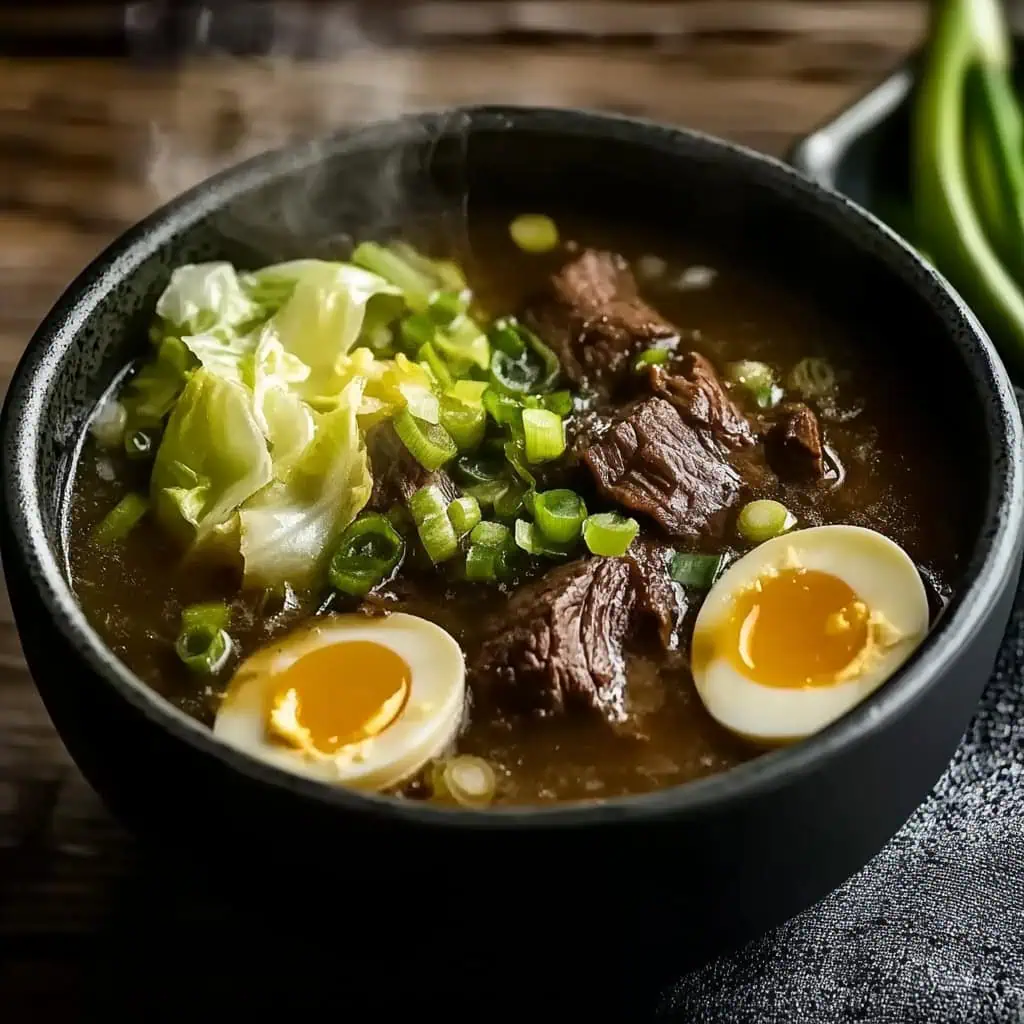

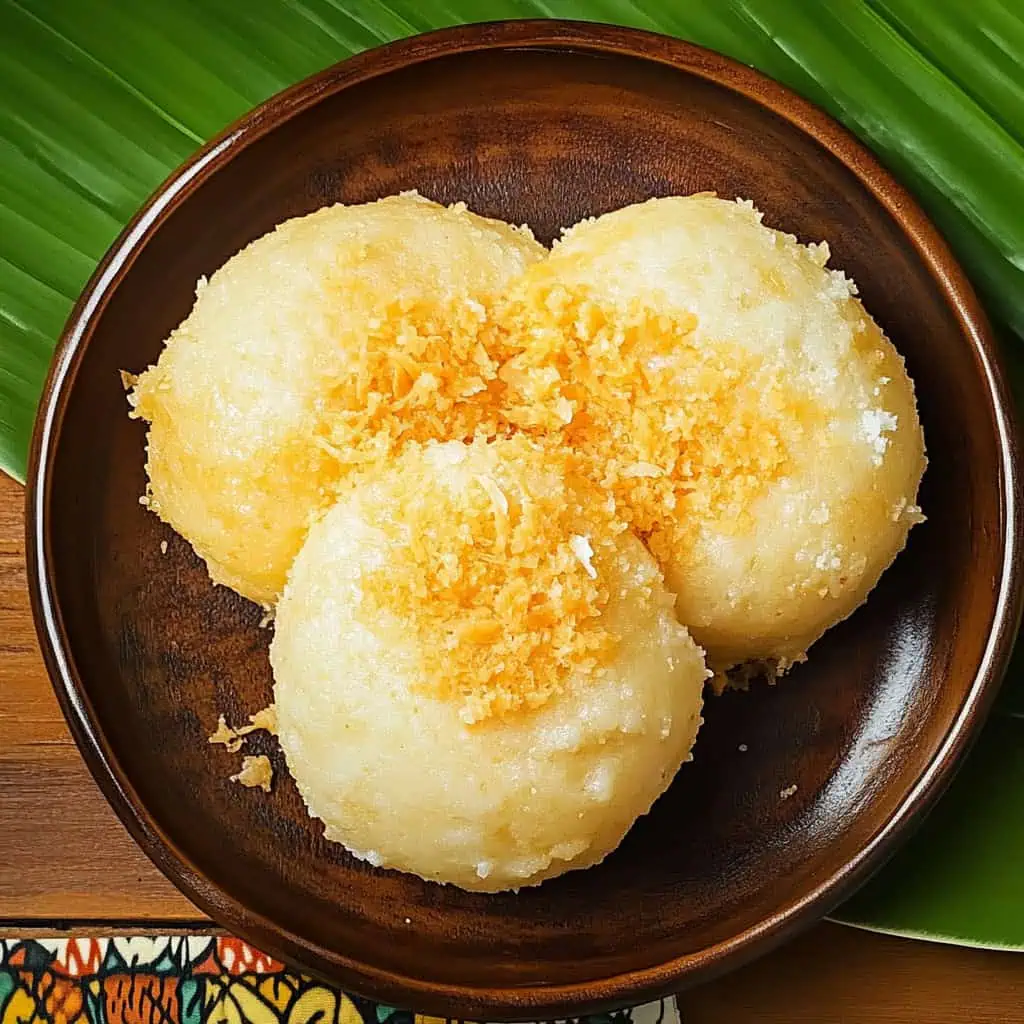
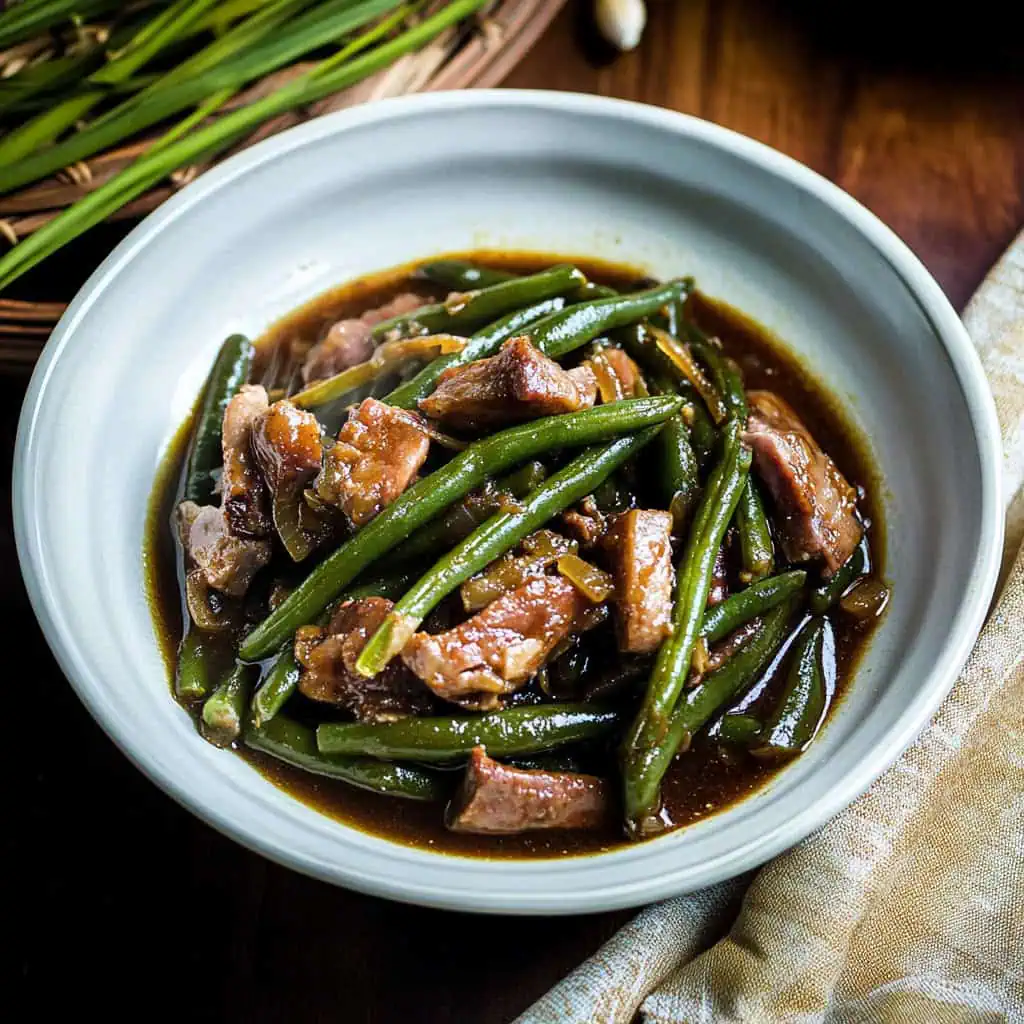

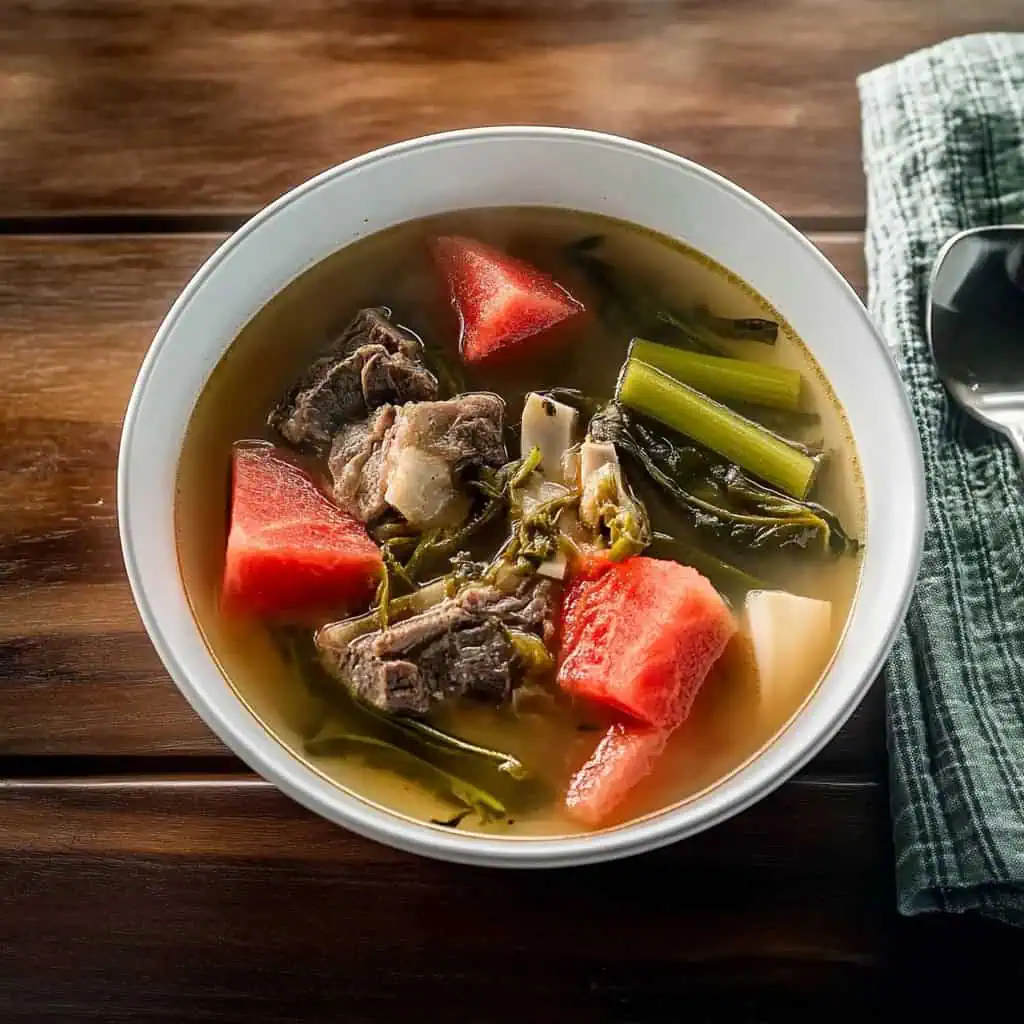
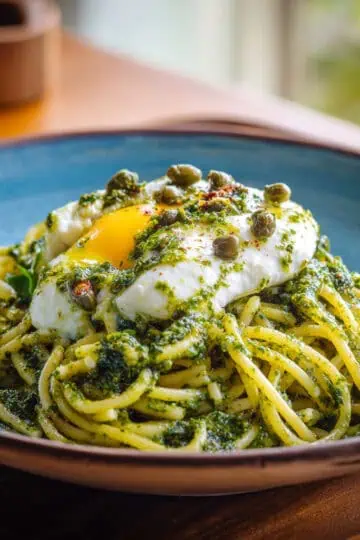
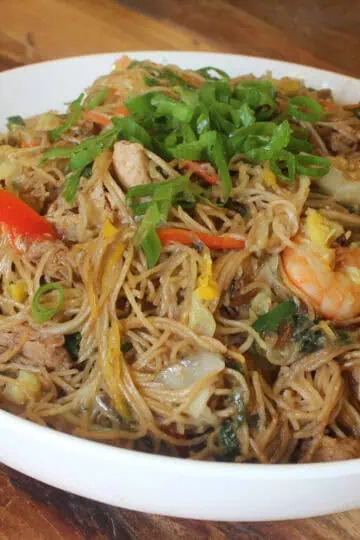
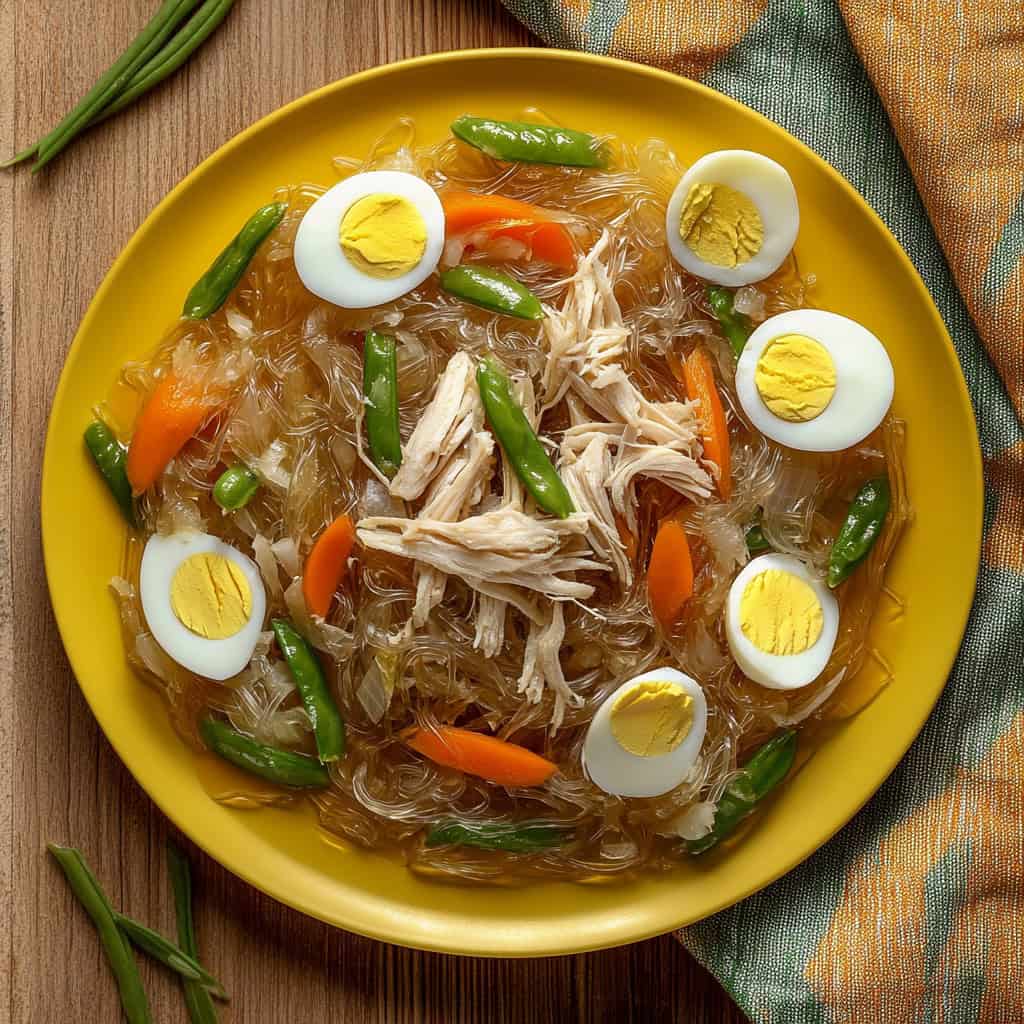
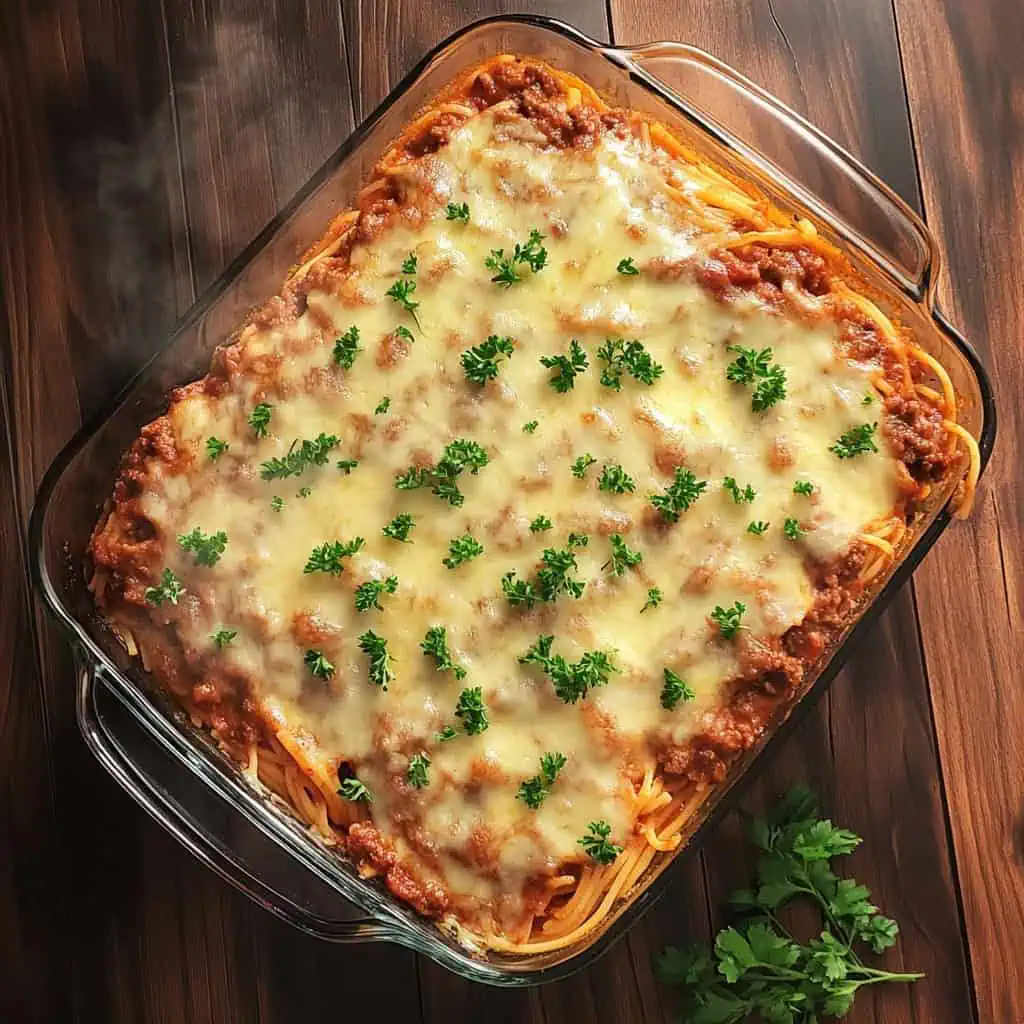
Comments
No Comments